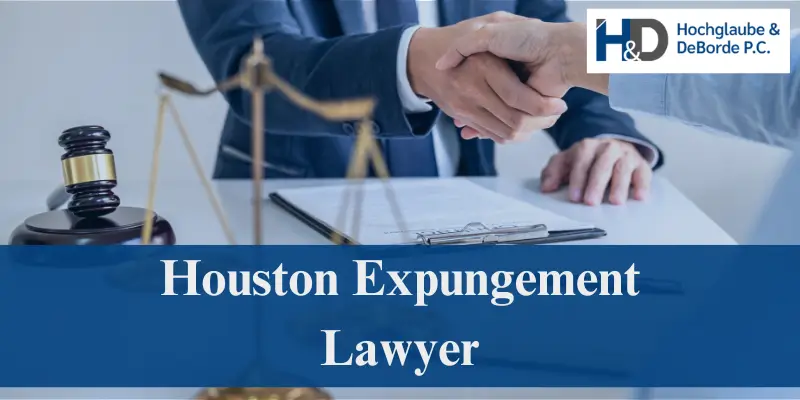Houston Expungement Lawyer
Houston Expungement and Record Sealing Criminal Defense Attorney
The founder of the Hochglaube & DeBorde Law Firm in Houston, criminal defense attorney Nicole DeBorde, strongly feels that your legal record should not be tarnished by brushes with the law dating back to your youth.
As a productive, solid Texas citizen, you may be able to obtain relief with a record expunction or petition for nondisclosure. These days, virtually anyone can gain access to your past criminal record. An emphasis on background checks has seen to that. When such negatives are turned up by potential employers, your record could get in the way of obtaining gainful employment, public benefits or decent housing.
That’s where experienced Houston expungement lawyer Nicole DeBorde’s invaluable legal assistance for expediting record sealing and expunction comes in. Contact her in Houston today by calling 713-526-6300.

Respected and Responsive Expunction Representation
A record expunction is a legal remedy that’s usually only available to you in certain situations. For example, if you’ve been arrested but your case was not filed or your case was dismissed. It’s also available if your case concluded with an acquittal. A record expunction (sometimes called an expungement) will effectively erase your criminal record.
If you have successfully completed what’s called a deferred adjudication, you may be eligible for nondisclosure relief. A petition for nondisclosure is a request that the government seal your criminal record from the prying eyes of the public. This sealing is not as thorough as an expunction, since the charge remains on your record.
If your criminal record from a bygone day continues to haunt your professional prospects, be in touch with our trusted Houston law firm today. The Hochglaube & DeBorde Law Firm can help with respected, responsive representation.
Reputational damage from arrest and prosecution in a criminal matter can be devastating and lifelong both professionally and personally. Publicly available criminal records can prevent you from getting the job you want, affect your finances, prevent you from getting loans, prevent you from attending school activities with your family and even from living where you want to live. A Houston expunctions lawyer can help you explore the possibility of removing or sealing damaging records from public view.
The law firm of Hochglaube & DeBorde can help you with the record expunction or sealing process whether your cases were in Houston, Harris County, Fort Bend, Montgomery County, Brazoria County, and beyond. Whether you are interested in sealing records or removing them entirely through expunction, one of our experienced Houston-based lawyers can walk you through the options to clear your good name. If your case involves post-conviction matters, a post conviction lawyer can also assist in navigating the complexities of post-conviction relief and ensuring that your rights are protected throughout the process.
What Is a Texas Record Expunction?
In Texas, an expunction, often called expungement in other states, is a civil lawsuit which can be brought to clear arrests in certain criminal cases from a person’s record. Generally, with very limited exceptions, convictions cannot be expunged. Typically, records of arrest and criminal filings can be expunged after an accused individual has been acquitted, or found not guilty, by a judge or jury.
Some cases which have been dismissed can also be expunged depending on certain factors such as whether the case has been indicted and when the case was dismissed. Sometimes, people confuse the term expunction with sealing. Some records which cannot be expunged can still be subject to an order preventing the records from being visible to the public via a petition for non-disclosure. Unlike petitions for expunction, which are often filed in civil district court, petitions for non-disclosure are filed in the criminal court where the original case took place.
Juvenile records are another example of records which are sealed as opposed to expunged if a petition is filed and an order granting the petition is made by the court. Petitions for non-disclosure in adult criminal cases are generally made in certain cases after a person has successfully completed deferred adjudication, a type of community supervision. If you are dealing with juvenile records or charges, consulting with a juvenile defense lawyer can provide the specialized legal support needed to ensure the best possible outcome for a young person’s future.
Some cases are not statutorily eligible for sealing even after successful completion of deferred adjudication. Our team can discuss your options with you and answer questions about how you might be able to minimize the impact of an arrest record on your life.
If a petition for expunction is granted, an order will be issued for agencies served in the petition to destroy records related to the arrest and charge and would be prohibited from retaining or sharing such documents and reports. If a record is ordered sealed or non-disclosed, the records pertaining to the case are no longer visible to the public but will be available to certain law enforcement and government agencies.
The Petition for Expunction
The expunction process, sometimes in other states called the expungement process, has multiple steps that can vary depending on the type of case at issue and the county where the petition is being filed. Generally, a Petition for Expunction is filed in civil district court.
Many people do not realize that even after an acquittal or dismissal, records of the case and arrest are still visible to the public unless an expunction has been ordered. In certain circumstances, a petition for expunction can be filed in the court where the acquittal took place if filed within a certain timeline and statutory guidelines set forth by Chapter 55 of the Texas Code of Criminal Procedure.
A good expunction attorney can help you determine your eligibility to clear certain cases and arrests from your record and then help you pursue those petitions. You may be asked for detailed information to make sure the appropriate information is removed from your records, and you may need to submit a notarized affidavit with your Petition for Expunction to the district court. Additionally, if you have federal crime convictions to be reviewed for validity, an experienced attorney can assist in reviewing and challenging those convictions, ensuring that all legal avenues for clearing or reducing your record are explored.
An experienced criminal defense lawyer can help you be sure that you understand your options and that your interests are protected. When it is possible to remove arrest records from your history, doing so at the first opportunity can help you avoid serious life altering consequences and reputational damage.
What information is typically included in a Petition for Expunction? The petition will include information such as:
- The case or arrest that the petitioner is trying to remove from their record
- A list of agencies with records of the arrest or case
- Details to help the agencies identify which records need to be erased, destroyed or discarded Certain personal information to ensure all records eligible for expunction are included in the order
A good expunction lawyer will be able to clearly explain what records are eligible for expunction, which are eligible only for sealing and the effect of both types of petitions. .
The Expunction Hearing Process
Whether your expunction petition was filed in the city of Houston, Harris, Fort Bend, Brazoria, Mongomery County or elsewhere in Texas, the process is similar. After the court receives the petition, the court will set a hearing date and let all relevant parties know about the hearing date. All these parties, otherwise known as respondents, can express whether they agree with the expunction or wish to fight the request. If the petitioner meets all the statutory expunction requirements, then they will be granted expenditure, and an order will be issued by the court.
After an order expunging record is issued, notice of the order will be sent to each of the responding agencies. After the order is sent to every organization that has information related to the existing case, those agencies will identify and destroy the records or provide them to the court for inspection and disposal.
In a time when very personal records can be viewed by the public by entering a few keystrokes, managing what is available to the public can be critical to maintain your good reputation. Even if you cannot get your record expunged, you may be able to get it sealed via a petition for non-disclosure.
If you have successfully completed what is called a deferred adjudication, you may be eligible for nondisclosure relief or sealing. A petition for nondisclosure is a request that the government seal your criminal record from public view. This sealing is not as thorough as an expunction since the charge remains on your record and is visible to law enforcement and other enumerated entities. If you’re seeking to navigate this process in Houston, an experienced attorney can guide you through the steps to ensure your record is sealed appropriately.
If your criminal record from a bygone day continues to haunt your professional prospects, be in touch with our trusted Houston law firm today. The Hochglaube & DeBorde Law Firm can help with respected, responsive representation.
What Are the Reasons for Expunction in Texas?
Let one of our experienced lawyers assist you in determining whether you are eligible to have your case expunged or sealed.
A criminal defense attorney from the law firm of Hochglaube & DeBorde can help advise you on what your timeline might be for filing for expunction as well as your eligibility.
Texas Acquittal Cases
If a Texan accused went to trial for a crime and was found to be not guilty, then the charges can often be completely cleared from their criminal record, but this is not automatic. A petition for expunction of that case and those records must be filed. In Texas, it is essential to work with an experienced attorney who can help guide you through the petition process to ensure that your record is properly cleared.
If you were acquitted, but your case is still on your criminal record, then a Houston criminal record sealing attorney from Hochglaube & DeBorde can work with you to help clear your good name.
Get Help with Your Expungement Case Today
Discuss the possibility of expungement with the Hochglaube & DeBorde Law Firm’s experienced criminal defense lawyer Nicole DeBorde. You can easily schedule a free confidential consultation and case evaluation by calling 713-526-6300 or by faxing or e-mailing us. Contact her today.



